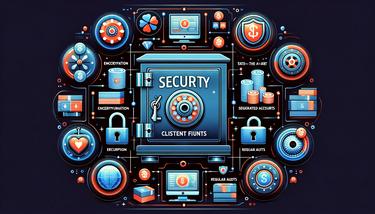How to ensure reliable and safe storage of client funds in a gambling company?
Ensuring the reliable and safe storage of client funds is paramount for gambling companies. This involves segregating client funds from company operational funds, adhering to stringent financial regulations, employing trusted banking partners, and undergoing regular financial audits. Additionally, the use of encryption[1] for financial transactions and compliance[2] with international standards such as ISO/IEC 27001 for information security management are crucial.
Key Facts
- Segregation of client funds from company’s operational funds.
- Compliance with stringent financial regulations and regular audits.
- Use of encryption for financial transactions.
Ensuring the reliable and safe storage of client funds in a gambling company is paramount, not only for the protection of customer assets but also for maintaining the integrity and trustworthiness of the gambling industry. This involves a combination of regulatory compliance[3], technological solutions, and operational best practices designed to safeguard funds against fraud, theft, and other financial risks. Implementing robust measures for the secure storage of client funds can also help gambling companies navigate the complex regulatory landscapes of different jurisdictions. Here’s how companies can achieve this crucial objective:
Regulatory Compliance and Licensing
Compliance with local and international regulatory standards is the first step towards ensuring the safety of client funds. Gambling companies must obtain the necessary licenses to operate, which typically involve stringent requirements for financial security and consumer protection[4]. Adhering to these standards helps establish a legal framework for the operation of gambling activities and the protection of customer funds.
Segregation of Client Funds
One of the most effective ways to ensure the safety of client funds is by segregating them from the company’s operating funds. This means maintaining customer deposits in separate bank accounts, ensuring that these funds are not used for operational expenses or investments. Segregation protects client funds in the event of the company’s financial instability or insolvency, guaranteeing that customers can withdraw their balances at any time.
Use of Trusted Payment Systems
Employing reputable and secure payment systems for transactions is crucial. These systems should offer encryption, fraud detection, and other security measures to protect against unauthorized access and financial fraud. By partnering with established payment providers, gambling companies can leverage their expertise and infrastructure to ensure the secure processing of deposits and withdrawals.
Implementation of Advanced Security Measures
The adoption of advanced security technologies is essential for protecting client funds from cyber threats. This includes the use of encryption protocols for data transmission, secure socket layer (SSL) certificates for website security, and two-factor authentication[5] (2FA) for customer accounts. Regular security audits[6] and penetration testing can also help identify and mitigate potential vulnerabilities.
Regular Financial Audits and Reporting
Conducting regular financial audits and transparent reporting is key to maintaining the integrity of client fund management. Independent audits by reputable firms provide an objective assessment of the company’s financial health and compliance with regulatory requirements. Transparent reporting to regulatory bodies and customers fosters trust and demonstrates the company’s commitment to financial security.
Customer Education and Support
Educating customers about safe gambling practices and the importance of secure transactions can play a significant role in safeguarding client funds. Providing resources on how to protect personal and financial information, along with offering responsive customer support for reporting suspicious activities, empowers customers to contribute to the overall security ecosystem.
Adapting to New Technologies and Best Practices
Staying informed about emerging technologies and industry best practices is vital for the continuous improvement of client fund protection measures. Blockchain[7] technology, for example, offers new possibilities for secure and transparent fund management. Adapting to these innovations can enhance security and efficiency in handling client funds.
In conclusion, the reliable and safe storage of client funds in a gambling company requires a multifaceted approach, combining regulatory compliance, financial prudence, technological security, and customer education. By prioritizing the protection of client assets, gambling companies can build a solid foundation of trust and loyalty with their customers, contributing to a responsible and sustainable gambling ecosystem.
- Encryption — The process of converting information or data into a code, especially to prevent unauthorized access.
- Compliance — The act of adhering to legal standards and regulations established by governmental bodies and regulatory agencies, particularly in the context of financial operations and transactions involving cryptocurrencies.
- Regulatory Compliance — Adherence to laws, regulations, guidelines, and specifications relevant to business processes.
- Consumer Protection — Legal measures and regulations aimed at safeguarding the rights and interests of consumers within the cryptocurrency market, including protection against fraud, misinformation, and market manipulation.
- Two-Factor Authentication — An additional layer of security requiring users to provide two forms of identification before accessing their accounts or completing transactions.
- Security Audits — Independent examinations of a gambling operation's systems and practices to ensure compliance with security standards and the protection of customer data and funds.
- Blockchain — A decentralized digital ledger recording cryptocurrency transactions across multiple computers.
- UK Gambling Commission. 'Protection of customer funds.'
- International Organization for Standardization. 'ISO/IEC 27001 Information security management.'


